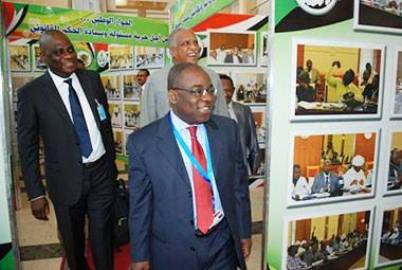UN expert urges Sudan to create conducive environment for dialogue
September 5, 2016 (KHARTOUM) – The United Nations Independent Expert on the situation of human rights in Sudan, Aristide Nononsi has called on the Sudanese government to create a conducive environment for a free and fair national dialogue with the participation of all stakeholders.

He said that human rights situation in Darfur, Southern Kordofan and Blue Nile remains precarious, pointing to the continued fighting and breaches of human rights and international humanitarian law by all parties to the conflict.
“Hundreds of thousands of civilians continue to suffer the effects of the armed conflict through direct attacks, displacement and limited access to humanitarian assistance.
The peace process continues to face significant challenges without the active participation of some major armed movements”.
The Sudanese army has been fighting the Sudan People’s Liberation Movement/North (SPLM-N) in South Kordofan and Blue Nile since 2011 and a group of armed movements in Darfur since 2003.
According to the UN, 200,000 people have been killed in the conflict, and 2, 5 million chased from their homes.
The report, which will be presented before the 33rd session of the United Nations Human Rights Council from13 to 30 September 2016 in Geneva, urged the government to ensure unhindered humanitarian access to all humanitarian organizations so that they could provide the assistance necessary to persons displaced by the conflicts in Darfur, Southern Kordofan and Blue Nile States.
Nononsi expressed concern about human rights challenges raised in his previous report that the Sudanese government had still not addressed.
“These included the violations committed during the oil-subsidy demonstrations in September 2013, press censorship, harassment of human rights defenders and curtailment of activities of civil society organizations, restrictions on freedom of religion, as well as arrests and detention of student activists”.
He encouraged the Sudanese authorities to ensure that an independent judicial inquiry was conducted into the killings of the September 2013 protests, saying he was informed about the ongoing compensation process for victims and families of victims of these incidents.
“Impunity for human rights violations would send the wrong message to victims, perpetrators and the wider public and would undermine the rule of law,” he said.
The demonstrations erupted in Sudan’s major towns in September 2013 following a decision by the government to lift subsidies on fuel and other basic commodities, leading to calls for regime change.
At least 200 protesters died, 15 of them children, with more than 800 others detained. However, the Sudanese government puts the death toll at 80.
The report pointed to the continued to clamp down on press and civil society organizations, stressing the need for the government to allow journalists human rights defenders to carry out their activities in an open, safe and secure environment.
The independent expert further called on the government to continue the process of reviewing national laws to comply with international human rights standards, stressing the need to withdraw “law enforcement powers, including the power of arrest and detention, from the National Intelligence and Security Service”.
“During the reporting period, there were widespread reports of arbitrary arrests and incommunicado detention perpetrated by the National Intelligence and Security Service,” he said.
It is noteworthy that Nononsi visited Sudan one time during the reporting period, from 14 to 28 April 2016.
(ST)
